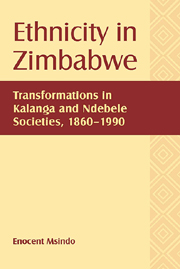Book contents
- Frontmatter
- Contents
- List of Illustrations
- Acknowledgments
- List of Abbreviations
- Note to the Reader
- Introduction
- 1 Ethnicity and Identities in Matabeleland
- 2 Domination and Resistance: Precolonial Ndebele and Kalanga Relations, 1860–93
- 3 Remaking Communities on the Margins: Chieftaincy and Ethnicity in Bulilima-Mangwe, 1893 to the 1950s
- 4 Ultraroyalism, King's Cattle, and Postconquest Politics among the Ndebele, 1893 to the 1940s
- 5 Language and Ethnicity in Matabeleland
- 6 Contests and Identities in Town: Bulawayo before 1960
- 7 Complementary or Competing? Ethnicity and Nationalism in Matabeleland, 1950–79
- 8 Postcolonial Terror: Politics, Violence, and Identity, 1980–90
- Conclusion
- Notes
- Selected Bibliography
- Index
- Rochester Studies in African History and the Diaspora
3 - Remaking Communities on the Margins: Chieftaincy and Ethnicity in Bulilima-Mangwe, 1893 to the 1950s
Published online by Cambridge University Press: 05 February 2013
- Frontmatter
- Contents
- List of Illustrations
- Acknowledgments
- List of Abbreviations
- Note to the Reader
- Introduction
- 1 Ethnicity and Identities in Matabeleland
- 2 Domination and Resistance: Precolonial Ndebele and Kalanga Relations, 1860–93
- 3 Remaking Communities on the Margins: Chieftaincy and Ethnicity in Bulilima-Mangwe, 1893 to the 1950s
- 4 Ultraroyalism, King's Cattle, and Postconquest Politics among the Ndebele, 1893 to the 1940s
- 5 Language and Ethnicity in Matabeleland
- 6 Contests and Identities in Town: Bulawayo before 1960
- 7 Complementary or Competing? Ethnicity and Nationalism in Matabeleland, 1950–79
- 8 Postcolonial Terror: Politics, Violence, and Identity, 1980–90
- Conclusion
- Notes
- Selected Bibliography
- Index
- Rochester Studies in African History and the Diaspora
Summary
Historiography, Chieftaincy, and Kalanga Ethnicity
The period from the 1890s to the 1950s was characterized by crucial political changes that influenced Zimbabwean society and culture. Not only did the British colonial officials become the new political overlords, they also tried to reinforce their presuppositions about their subjects. Under the guise of reinforcing African traditions, they attempted to institutionalize chieftaincy and make chiefs function as if they were organic, traditional leaders when in reality some of those chiefs had been reduced to colonial pawns without popular legitimacy, the izindunyana zaka makiwa (white people's minor chiefs). Such chiefs usually became infamous with their people, who neither ascribed to them a representative mandate nor recognized their legal right to adjudicate in chiefs' courts. This hostility to imposed chiefs was clear in Bulilima-Mangwe, a predominantly Kalanga area where the colonial administration attempted to place some Kalanga communities under Ndebele chiefs. In parts of Bubi, however, where commoners were generally Ndebelecized, the debate about “tribal” representation revolved around the ideology of nineteenth-century Ndebele kingship from which commoners expected “real” Ndebele chiefs to draw their legitimacy. Essentially, the struggle was not just about the nature and source of the chiefs' political authority; it was also about their ethnic identity. In areas where people were ruled by perceived ethnic strangers, the contesting or rebelling society often retold local histories that justified ethnic separateness so as to legitimize its claims for an alternative chieftaincy.
- Type
- Chapter
- Information
- Ethnicity in ZimbabweTransformations in Kalanga and Ndebele Societies, 1860-1990, pp. 65 - 92Publisher: Boydell & BrewerPrint publication year: 2012



